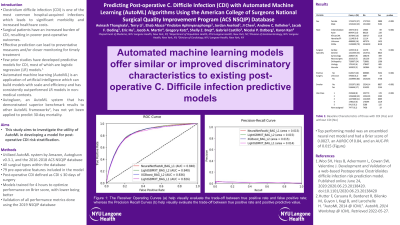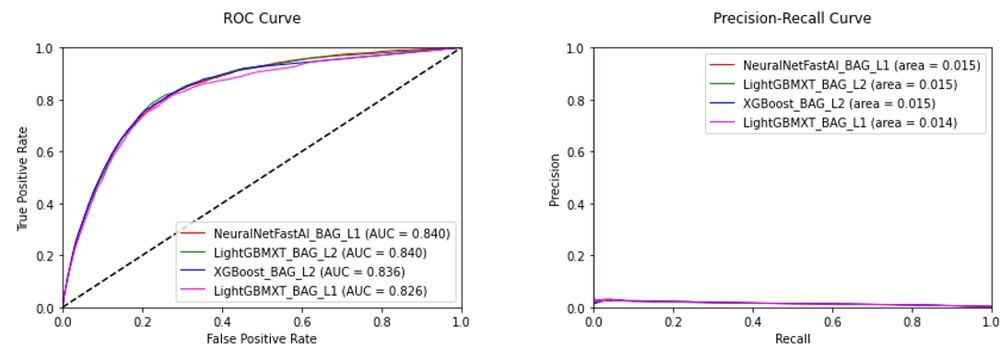Back


Poster Session C - Monday Afternoon
Category: Colon
C0102 - Predicting Post-Operative C. difficile Infection (CDI) With Automated Machine Learning (AutoML) Algorithms Using the American College of Surgeons National Surgical Quality Improvement Program (ACS NSQIP) Database
Monday, October 24, 2022
3:00 PM – 5:00 PM ET
Location: Crown Ballroom

Has Audio
- AT
Avinash Thangirala, MD
New York University Langone Health
New York, NY
Presenting Author(s)
Avinash Thangirala, MD1, Terry Li, MD2, Ehab Abaza, MD1, Yindalon Aphinyanaphongs, PhD1, Jordan Axelrad, MD, MPH3, Ji Chen, BS1, Andrew Kelleher, BS1, Jacob Oeding, MS1, Eric Hu, BS1, Jacob Martin, MD1, Gregory Katz, MD1, Shelly Brejt, MD1, Gabriel Castillo, MD4, Nicolai Ostberg, MS1, Karen Kan, MD1
1New York University Langone Health, New York, NY; 2NYU Langone Health, New York, NY; 3NYU Grossman School of Medicine, New York, NY; 4New York University Langone Medical Center, New York, NY
Introduction: Clostridium difficile infection (CDI) is one of the most common hospital-acquired infections leading to prolonged hospitalization and significant morbidity. Only a few prior studies have developed predictive risk models for CDI and all but one have utilized logistic regression (LR) models to identify risk factors. Automated machine learning (AutoML) programs consistently outperform standard LR models in non-medical contexts. This study aims to investigate the utility of AutoML methods in developing a model for post-operative CDI prediction.
Methods: We used an AutoML system developed by Amazon, Autogluon v0.3.1, to evaluate the prediction accuracy of post-surgical CDI using the 2016-2018 ACS NSQIP database. A total of A total of 3,049,617 patients and 79 pre-operative features were included in the model. Post-operative CDI was defined as CDI within 30 days of surgery. Models were trained for 4 hours to optimize performance on the Brier score, with lower being better. Validation of all performance metrics was done using the 2019 NSQIP database.
Results: 0.36% of the patients (n = 11,001) developed post-operative CDI. Brier scores were calculated for each model with the top performing model being an ensembled neural net model having a Brier score of 0.0027 on the test set. The corresponding AUROC and AUC-PR was 0.840 and 0.015 respectively (figure).
Discussion: The models generated via AutoML to predict post-operative CDI had discriminatory characteristics greater than or equal to those models reported in the literature. Future post-operative CDI models may benefit from automated machine learning techniques.

Disclosures:
Avinash Thangirala, MD1, Terry Li, MD2, Ehab Abaza, MD1, Yindalon Aphinyanaphongs, PhD1, Jordan Axelrad, MD, MPH3, Ji Chen, BS1, Andrew Kelleher, BS1, Jacob Oeding, MS1, Eric Hu, BS1, Jacob Martin, MD1, Gregory Katz, MD1, Shelly Brejt, MD1, Gabriel Castillo, MD4, Nicolai Ostberg, MS1, Karen Kan, MD1. C0102 - Predicting Post-Operative C. difficile Infection (CDI) With Automated Machine Learning (AutoML) Algorithms Using the American College of Surgeons National Surgical Quality Improvement Program (ACS NSQIP) Database, ACG 2022 Annual Scientific Meeting Abstracts. Charlotte, NC: American College of Gastroenterology.
1New York University Langone Health, New York, NY; 2NYU Langone Health, New York, NY; 3NYU Grossman School of Medicine, New York, NY; 4New York University Langone Medical Center, New York, NY
Introduction: Clostridium difficile infection (CDI) is one of the most common hospital-acquired infections leading to prolonged hospitalization and significant morbidity. Only a few prior studies have developed predictive risk models for CDI and all but one have utilized logistic regression (LR) models to identify risk factors. Automated machine learning (AutoML) programs consistently outperform standard LR models in non-medical contexts. This study aims to investigate the utility of AutoML methods in developing a model for post-operative CDI prediction.
Methods: We used an AutoML system developed by Amazon, Autogluon v0.3.1, to evaluate the prediction accuracy of post-surgical CDI using the 2016-2018 ACS NSQIP database. A total of A total of 3,049,617 patients and 79 pre-operative features were included in the model. Post-operative CDI was defined as CDI within 30 days of surgery. Models were trained for 4 hours to optimize performance on the Brier score, with lower being better. Validation of all performance metrics was done using the 2019 NSQIP database.
Results: 0.36% of the patients (n = 11,001) developed post-operative CDI. Brier scores were calculated for each model with the top performing model being an ensembled neural net model having a Brier score of 0.0027 on the test set. The corresponding AUROC and AUC-PR was 0.840 and 0.015 respectively (figure).
Discussion: The models generated via AutoML to predict post-operative CDI had discriminatory characteristics greater than or equal to those models reported in the literature. Future post-operative CDI models may benefit from automated machine learning techniques.

Figure: The top performing model had a Brier score of 0.0027, an AUROC of 0.840, an AUC-PR of 0.015
Disclosures:
Avinash Thangirala indicated no relevant financial relationships.
Terry Li indicated no relevant financial relationships.
Ehab Abaza indicated no relevant financial relationships.
Yindalon Aphinyanaphongs indicated no relevant financial relationships.
Jordan Axelrad: AbbVie – Consultant. BioFire Diagnostics – Consultant, Grant/Research Support. BMS – Consultant. Janssen – Consultant. Pfizer – Consultant.
Ji Chen indicated no relevant financial relationships.
Andrew Kelleher indicated no relevant financial relationships.
Jacob Oeding indicated no relevant financial relationships.
Eric Hu indicated no relevant financial relationships.
Jacob Martin indicated no relevant financial relationships.
Gregory Katz indicated no relevant financial relationships.
Shelly Brejt indicated no relevant financial relationships.
Gabriel Castillo indicated no relevant financial relationships.
Nicolai Ostberg indicated no relevant financial relationships.
Karen Kan indicated no relevant financial relationships.
Avinash Thangirala, MD1, Terry Li, MD2, Ehab Abaza, MD1, Yindalon Aphinyanaphongs, PhD1, Jordan Axelrad, MD, MPH3, Ji Chen, BS1, Andrew Kelleher, BS1, Jacob Oeding, MS1, Eric Hu, BS1, Jacob Martin, MD1, Gregory Katz, MD1, Shelly Brejt, MD1, Gabriel Castillo, MD4, Nicolai Ostberg, MS1, Karen Kan, MD1. C0102 - Predicting Post-Operative C. difficile Infection (CDI) With Automated Machine Learning (AutoML) Algorithms Using the American College of Surgeons National Surgical Quality Improvement Program (ACS NSQIP) Database, ACG 2022 Annual Scientific Meeting Abstracts. Charlotte, NC: American College of Gastroenterology.
